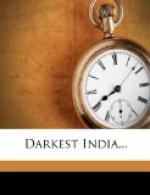THE CRIMINALS.
The most recent report of the Indian Government informs us that there are now no less that 737 Jails in British India (exclusive of Native Territory), with an average population of 75,922 prisoners. In the course of last year in the Bombay Presidency alone no less than 76,000 criminals were convicted, while 152,879 were placed on trial before the various courts. In the whole of India the number of annual convictions amount to upwards of one million, while the number who appear before the Court are at least twice as numerous. Again, there are also immense numbers of offences committed yearly, in which the Police are unable to get any clue, the offenders having succeeded in eluding altogether the vigilance of the Law. For instance a celebrated outlaw has only recently been apprehended in Central India after several years of successful and daring robbery, arson, mutilation and murder. Indeed in many parts of India there are predatory tribes and communities of thieves who have to be perpetually under Police surveillance, and who are brought up from their infancy to thieving as a profession.
We desire to plead the cause of the voiceless multitude who occupy our Indian Jails. The fact that they are voiceless,—that they have no means of voicing their claims, their wrongs and their rights (for they, too, have rights), only adds to their danger. How can a criminal hope for redress? What chance has he of being heard? Who will listen? What advocate will plead his cause? Ah, if he happen to be rich, it is true, he will have many friends! But as a rule the criminal is poor. Often he has to choose between crime and starvation. For himself he might prefer to starve, but the sight of his emaciated wife and aged parents,—with whom, criminal though he be, he is as a rule ready to share his last crust,—the clamour of his hungry children, all this drives him to desperation and to a life of crime. He can only give voice to his sorrows and his needs by some fresh act of lawlessness. Hence the occasional outbursts of mutiny, and the murders of jail warders, which from time to time reach the newspapers and shock the public ear.
And here I would desire to call attention to the fact that though crime must be vigorously dealt with and punished, at the same time the tendency of punishment is not to reform, but to harden. Who does not know that the worst criminals are those who have been longest in Jail? Instead of getting better they grow daily worse,—more adept in committing crime and eluding detection,—more careless as to its consequences.
Equally futile would be the offer of a wholesale pardon. A singular illustration of this occurred in 1887, when in honour of Her Majesty’s Jubilee in the Bombay Presidency alone, no less than 2,465 prisoners were released out of a total of 6,087. Yet the Government report goes on to show that within a few months of their release the Jails were fuller than ever!




